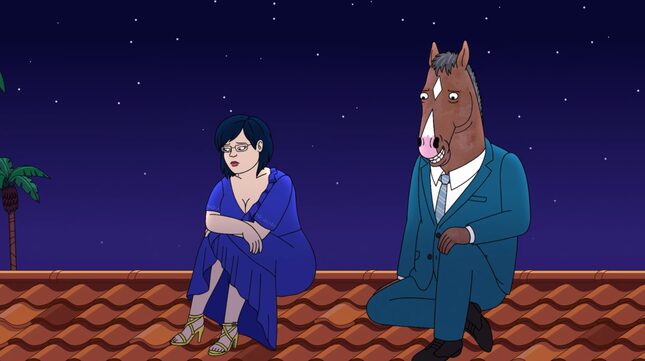

When the first trailer for Bojack Horseman’s final season appeared online last fall, it teased a satisfying end to a show whose cast of animated animals (and some humans) never really worked towards happiness, despite desiring it. That hypocrisy made it a critical darling. It wasn’t uncommon to see tweets about the emotional resonance found in an unlikable “cartoon horse.” In fact, it was because the animation created a distance that the show was able to tackle heavy topics with nuance and without appearing overly sentimental. That was confirmed when the second half of Bojack Horseman’s final season hit Netflix on January 31 and the finale left little emotional resolution. Leave it to the crushingly honest and unlikable cartoon horse to end his story the same way it has always existed: accepting of ambiguous conclusions.
Spoilers ahead.
Season 6 began with Bojack (voiced by Will Arnett) in rehab for real, working out his addiction but not necessarily his interior self. He memorizes phrases about powerlessness, learns to give up the bottle, and apologies to the people (young women) he’s wronged, to the best of his ability. Those who remain in his life, like Diane (Alison Brie) and Princess Carolyn (Amy Sedaris), stay loyal to him while he makes amends and ignores his friends’ dilemmas—Diane’s battle with depression and writing, and Carolyn’s futile attempt to have it all and appear perfect while doing so—because, despite his flaws, they see his potential. If only it were that easy. Bojack’s plan for reinvention without consequence is thwarted by ambitious reporters at the fictitious Hollywoo Reporter who begin to implicate him in the death of his former co-star, Sarah Lynn, leading to the final episodes of the season. Horseman attempts to make a new, simple, and sober life for himself as a professor, but his past has a way of catching up with him.
A series of disappointments follow. His half-sister Hollyhock (Aparna Nancherla) estranges herself from him. He relapses. He becomes blacklisted from the industry and most of society when his past abuses come to light. In those episodes, it seems like the show is rushing into a MeToo conversation in which the viewer is meant to sympathize with an abuser, but thankfully, it never drives that point home. Instead, Bojack finds that in accepting himself as an addict, he continued to see himself as a victim unable to own up to his actions. And this avoidance made him unavailable to the people he steamrolled. It’s not until much later in the season that he realizes his stinginess is a weakness that requires real reflection. Rehabilitation isn’t a quick fix, and it’s not his only issue. Bojack only recently found the cause of his unhappiness, but fails to recognize that identifying as an addict isn’t the same thing as excusing past indiscretions acted out while intoxicated—he has yet to hold himself accountable, a prevalent theme in the show’s arc. (And like alleged abusers in Hollywood, he rebrands as a PC-culture hating comedian-type to keep his career afloat. Redemption is inevitable for powerful men, even when they’re an animated horse.)
Because Bojack’s perception is so divorced from reality, the show doesn’t explain his post-rehab recovery and chooses to close its final chapter with an imperfect ending, which is perfect for Bojack: there may be no more episodes, but the understanding is that he has yet to realize his best life. Once again, the horse is painfully human.
Everything changes in the final two episodes, after a very drunk Bojack breaks into his old house and nearly drowns himself, consuming all of the booze and pills in the current resident’s cabinets. (Conspiracy theorists like myself have linked his near-death experience to the image of Bojack in the pool from the show’s opening theme. Many fans believed he was always meant to drown.) He has a surrealist dream before almost dying that allows him to contextualize his life and death. He recognizes that there are consequences for his actions and that he needs to start dealing with them if he’s ever going to be happy. It’s then that the show ends where it began: Bojack and Diane sneaking away from a party to confide in one another. It’s a simple scene, but an impactful one—it’s there that Diane flips the “life’s a bitch and then you die” clichéd maxim on him (“Sometimes life’s a bitch, and then you keep living”) because Bojack Horseman was never going to be a show about dying. The aim was never to become a long-winding cautionary tale about fame and bad men. It instead asks viewers to consider rock bottoms as opportunity for growth without absolving its protagonist.Some fans might find that to be unsatisfying, and for them, it might be. I don’t think it is—like all every topic the show has courageously covered in its six seasons, Bojack’s ending drives the point home that there are no neatly wrapped conclusions. In fact, it’s almost boring—life’s a bitch, but it goes on.